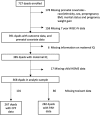Prepregnancy obesity is associated with cognitive outcomes in boys in a low-income, multiethnic birth cohort
- PMID: 31862007
- PMCID: PMC6924019
- DOI: 10.1186/s12887-019-1853-4
Prepregnancy obesity is associated with cognitive outcomes in boys in a low-income, multiethnic birth cohort
Abstract
Background: Maternal obesity and high gestational weight gain (GWG) disproportionally affect low-income populations and may be associated with child neurodevelopment in a sex-specific manner. We examined sex-specific associations between prepregnancy BMI, GWG, and child neurodevelopment at age 7.
Methods: Data are from a prospective low-income cohort of African American and Dominican women (n = 368; 44.8% male offspring) enrolled during the second half of pregnancy from 1998 to 2006. Neurodevelopment was measured using the Wechsler Intelligence Scale for Children (WISC-IV) at approximately child age 7. Linear regression estimated associations between prepregnancy BMI, GWG, and child outcomes, adjusting for race/ethnicity, marital status, gestational age at delivery, maternal education, maternal IQ and child age.
Results: Overweight affected 23.9% of mothers and obesity affected 22.6%. At age 7, full-scale IQ was higher among girls (99.7 ± 11.6) compared to boys (96.9 ± 13.3). Among boys, but not girls, prepregnancy overweight and obesity were associated with lower full-scale IQ scores [overweight β: - 7.1, 95% CI: (- 12.1, - 2.0); obesity β: - 5.7, 95% CI: (- 10.7, - 0.7)]. GWG was not associated with full-scale IQ in either sex.
Conclusions: Prepregnancy overweight and obesity were associated with lower IQ among boys, but not girls, at 7 years. These findings are important considering overweight and obesity prevalence and the long-term implications of early cognitive development.
Keywords: Body mass index; Child; Cognition; Obesity; Overweight; Pregnancy; Prospective studies; Wechsler scales.
Conflict of interest statement
The authors declare that they have no competing interests.
Figures
References
-
- Dawson-McClure S, Calzada E, Huang KY, et al. A population-level approach to promoting healthy child development and school success in low-income, urban neighborhoods: impact on parenting and child conduct problems. Prevention science : the official journal of the Society for Prevention Research. 2015;16(2):279–290. doi: 10.1007/s11121-014-0473-3. - DOI - PMC - PubMed
-
- Fryar C, Carrol M, Ogden C. Prevalence of overweight, obesity, and extreme obesity among adults aged 20 and over: United States, 1960–1962 through 2013–2014. Surveys DoHaNE, editor: In; 2016.



